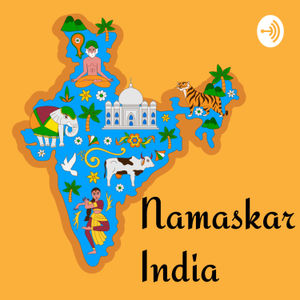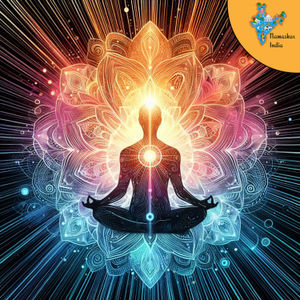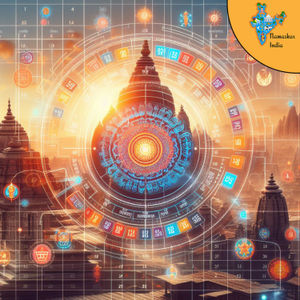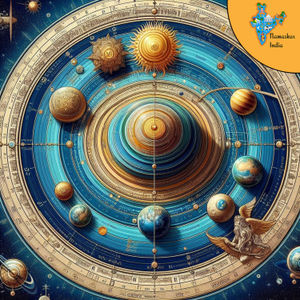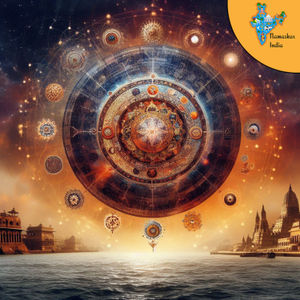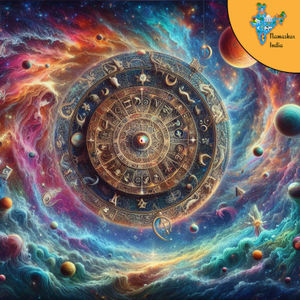Recent Episodes
In this episode, we delve into the importance and mystery surrounding Navgrahas in Hinduism, detailing their influence on various aspects of human life. Using the Navgraha Stotram, we explore the philosophical significance behind these celestial entities while highlighting the interconnectedness of the universe.
Bibliography:
Dreyer, R. G. (1997). Vedic Astrology: A Guide to the Fundamentals of Jyotish. Lotus Press.
Rath, S. (2010). Navagraha Stotram: A Hymn to the Nine Planets. Sagittarius Publications.
DeFouw, H., & Svoboda, R. (1996). Light on Life: An Introduction to the Astrology of India. Samuel Weiser, Inc.
Topic: History of India
Ko-fi: http://ko-fi.com/namaskarindia
UPI ID: 9893547492@paytm
Paypal: https://www.paypal.com/paypalme/aduppala
Instagram: https://www.instagram.com/namaskarindialive/
Facebook: https://www.facebook.com/namaskarindialive
Twitter: https://twitter.com/AradhanaDuppala
Youtube: https://www.youtube.com/c/NamaskarIndia
WhatsApp Discussions: https://chat.whatsapp.com/H8IUJPlB32cA2soTjrTghV
WhatsApp Announcements: https://chat.whatsapp.com/KVd5UHxumW90TxLHjkB89k
This episode explores the origin of the seven-day week from an astronomical, historical, and cultural perspective. We discuss how Hindu astronomers identified grahas and how the Brihat Parasara Hora Shastra outlines a method to establish the seven-day week. We also look at how the idea of the seven-day week originated in ancient Babylon and was adopted by other civilizations.
Bibliography:
Satyabhama A. (2014). Astronomy and Mathematics in Ancient India: An Overview. Manglam Publishers.
Zerubavel, E. (1985). The Seven-Day Circle: The History and Meaning of the Week. The Free Press.
Sastri, R. (1985). Brihat Parasara Hora Sastra: The gospel book of Hindu astrology. Ranjan Publications.
Kupfer, P. (1996). The Seven-Day Week: The History and Meaning of the Week. UCL Press.
Whitrow, G. J. (1982). The Seven-Day Circle: The History of the Week and the Calendar. University of South Carolina press.
Topic: History of India
Ko-fi: http://ko-fi.com/namaskarindia
UPI ID: 9893547492@paytm
Paypal: https://www.paypal.com/paypalme/aduppala
Instagram: https://www.instagram.com/namaskarindialive/
Facebook: https://www.facebook.com/namaskarindialive
Twitter: https://twitter.com/AradhanaDuppala
Youtube: https://www.youtube.com/c/NamaskarIndia
WhatsApp Discussions: https://chat.whatsapp.com/H8IUJPlB32cA2soTjrTghV
WhatsApp Announcements: https://chat.whatsapp.com/KVd5UHxumW90TxLHjkB89k
Join us in this episode as we explore the fascinating world of ancient Indian astronomy and astrology. We discuss the relationship between these two fields and how they evolved from naturalistic observations of celestial bodies.
Bibliography:
Subbarayappa, B. V. (1994). Indian Astronomy: An Introduction. Cambridge University Press.
Ramasubramanian, K., & Srinivas, M. D. (1994). Astronomy and Mathematics in Ancient India. Cambridge University Press.
Sharma, P. (2017). The Story of Astronomy in India. Penguin Random House India.
Topic: History of India
Ko-fi: http://ko-fi.com/namaskarindia
UPI ID: 9893547492@paytm
Paypal: https://www.paypal.com/paypalme/aduppala
Instagram: https://www.instagram.com/namaskarindialive/
Facebook: https://www.facebook.com/namaskarindialive
Twitter: https://twitter.com/AradhanaDuppala
Youtube: https://www.youtube.com/c/NamaskarIndia
WhatsApp Discussions: https://chat.whatsapp.com/H8IUJPlB32cA2soTjrTghV
WhatsApp Announcements: https://chat.whatsapp.com/KVd5UHxumW90TxLHjkB89k
--- Support this podcast: https://podcasters.spotify.com/pod/show/namaskar-india/supportIn this episode, we explore the cyclical nature of time in Hindu mythology and its unique differences from other religions. We delve into various time units described in ancient Indian texts, from microcosm to macrocosm, and explain the concept of relativity of time in different realms. We also discuss modern science's definition of time, theories predicting multiverse and the discrepancy between scientific estimates and those described in Hindu scriptures. Tune in to discover the remarkable imagination and intellectual depth of our Indian ancestors as they contemplated time scales spanning trillions of years.
Calculations:
According to Hindu scriptures, we are in Brahma's 51st year's, 1st Kalpa's, 7th Manvantar's, 28th Chaturyuga's, Kalyuga. The Gregorian calendar dates the beginning of this Kalyuga to 3102 BCE. And Brahma's total lifespan is 100 Brahma years. What is Brahma's total lifespan in human years? What is the universe's current age in human years?
Satya Yuga = 1.728 million years
Treta Yuga = 1.296 million years
Dwapara Yuga = 0.864 million years
Kali Yuga = 0.432 million years
Total duration of one Maha Yuga cycle = 4.32 million human years
One day of Brahma (consisting of 1000 Maha Yuga cycles) = 4.32 billion human years
One complete day and night of Brahma = 8.64 billion human years
1 Brahma year = 360 Brahma days and nights
Total age of Brahma (100 Brahma years) = 360 days/year x 100 years x 8.64 billion years/day = 311.04 trillion human years
Total age of the universe (one Maha Kalpa) = 311.04 trillion human years
1 Manvantar = 71 Chaturyugas
1 Kalpa = 14 Manvantar
Current age of the universe = (50 x 2 x 360 x 1000 x 4,320,000) + (6 x 71 x 4,320,000) + (27 x 4,320,000) (4,320,000 x (0.4 + 0.3 + 0.2)) + 5124 = 155.52 trillion human years
Bibliography:
Debroy, B. (2010). The Mahabharata. Penguin Books.
Easwaran, E. (2007). The Bhagavad Gita. Nilgiri Press.
Doniger, W. (2010). The Hindus: An Alternative History. Penguin Books.
Topic: Indian mythology | Hindu mythology | Hinduism
Ko-fi: http://ko-fi.com/namaskarindia
UPI ID: 9893547492@paytm
Paypal: https://www.paypal.com/paypalme/aduppala
Instagram: https://www.instagram.com/namaskarindialive/
Facebook: https://www.facebook.com/namaskarindialive
Twitter: https://twitter.com/AradhanaDuppala
Youtube: https://www.youtube.com/c/NamaskarIndia
WhatsApp Discussions: https://chat.whatsapp.com/H8IUJPlB32cA2soTjrTghV
WhatsApp Announcements: https://chat.whatsapp.com/KVd5UHxumW90TxLHjkB89k
